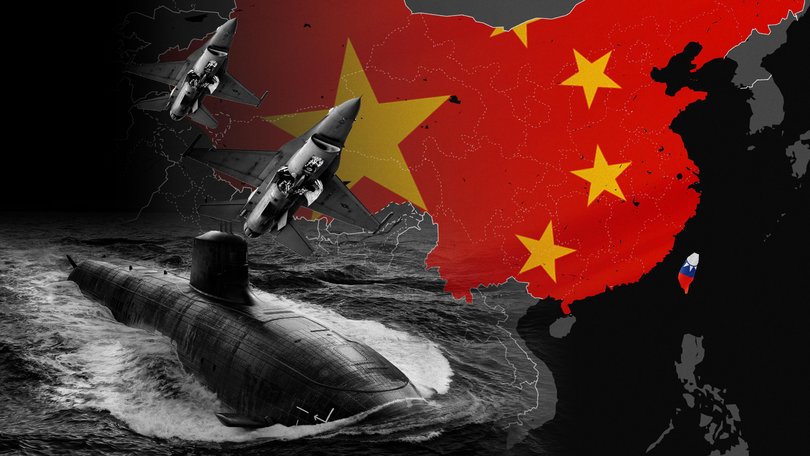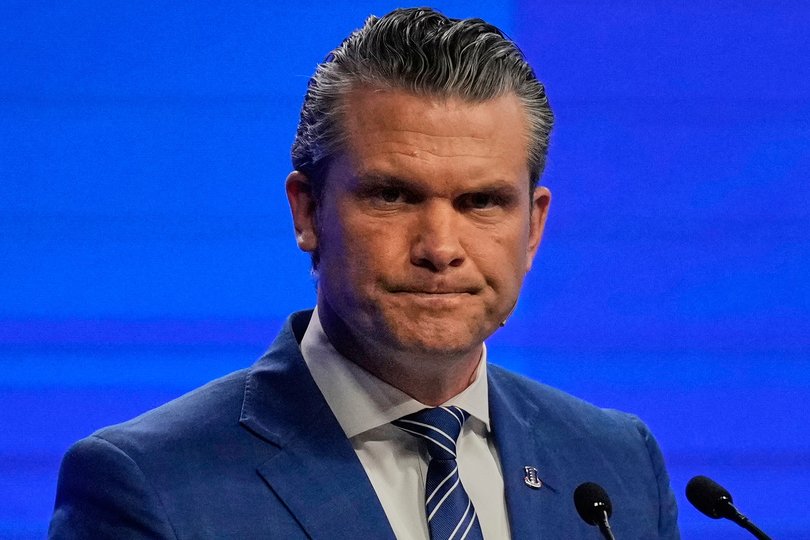Australia-China war: Fifty per cent chance of war with China in five years, says analyst
AARON PATRICK: A top defence expert has revealed when China will likely begin its attack on Taiwan with a naval and sea blockade and what that means for Australia.

Malcolm Davis, an analyst at a top defence think tank in Canberra, expects China to begin a naval and air blockade of Taiwan in 2027 or 2028.
As the island is strangled of trade, people and energy, preparations for an invasion will begin, Dr Davis says, forcing the US, Japan, South Korea and Australia to decide if they are prepared to commit, in a last desperate attempt at deterrence, to what would likely be Asia’s bloodiest war since 1975.
Dr Davis puts the odds of an invasion at 50 per cent. Which is why, like many other experts, the Australian Strategic Policy Institute analyst agrees with US Secretary of Defence Pete Hegseth’s request on Sunday to Australia to increase defence spending to 3.5 per cent of the economy from 2 per cent.
Sign up to The Nightly's newsletters.
Get the first look at the digital newspaper, curated daily stories and breaking headlines delivered to your inbox.
By continuing you agree to our Terms and Privacy Policy.Re-armament
The approach is a significant development in Australian foreign relations: the nation’s most important military ally is asking for a World War II-like re-armament to face a common threat.
The Federal Government hears the message, but does not accept the warning.
While Defence Minister Richard Marles says he is open to a discussion about increased military spending, there are no signs Anthony Albanese is about to agree to the equivalent of $42 billion extra.
The prime minister has other priorities, including debt relief for university students, and does not appear to share the experts’ gloomy predictions of war.
“Increasingly the defence policy community is getting frustrated because the government is refusing to listen,” Dr Davis says.

Why fight?
Even if China invades Taiwan, why would Australia want to join in? Why should Australians die for the Taiwanese, with whom we have never fought before and do not have a military treaty with? What would be the point of sending warships and aircraft against the world’s largest navy?
The end of Taiwan’s independence and subjugation to China would be a huge step back for democracy in Asia, which is home to about 60 per cent of the world’s population.
It would likely also, especially if the US were defeated militarily, establish China’s dominance over the Western Pacific and south-east Asian sea lanes.
These trade routes are pivotal to Australia’s economy. Australian coal, iron ore and liquefied natural gas passes through them to north Asia, including China. If China establishes control over what are now free seas, it may be able to intimidate Australia and its neighbours over trade, diplomatic and security matters.
The price of losing Taiwan is therefore so potentially large that many analysts believe defence spending should come before more welfare.
“If we lose the next war, the cost to the nation would be far higher than anything lost by spending on defence now,” Dr Davis said.
Aspiring to spend more
Mr Albanese agrees Australia needs to spend more on defence, but not as much as the US wants. On Monday, asked about Mr Hegseth’s request, the prime minister said the government had allocated an extra $10 billion over the next four years.
“That adds up to 2.3 per cent of GDP as where defence spending will rise,” he said.
The 2.3 per cent is figure is an aspiration, which the Australian Strategic Policy Institute calculates will not be reached in the next four years. Before the election, the Coalition promised to reach 2.5 per cent in five years, although did not say how the money would be spent.
The debate over Australia’s contribution to the US alliance is complicated by contradictory behaviour by America.
On Friday, US President Donald Trump said he would increase tariffs on steel and aluminium from 25 to 50 per cent.
Not only would the new trade barrier harm, and perhaps even eliminate, exports of these products from Australia to America, the decision compounds the uncertainty about global trade while President Trump is in power.

The next day, his administration offered hope to Western-aligned Asian countries fearful that the unpredictable Mr Trump might reduce or withdraw US military forces from the Pacific region, where it helps contain China, with Australia’s help.
“(The US) will not be pushed out of this critical region, and we will not let our allies and partners be subordinated and intimidated,” Mr Hegseth said at a defence-policy meeting in Singapore.
China reacted furiously to the comments, which is another reason why they will be welcomed from Seoul to Canberra. At the same time, compared with Australia, other countries in the region are under more pressure from Washington. Ms Hesgeth asked them to increase defence spending to 5 per cent.
The Aussie discount may not offer much comfort to Mr Albanese, who is scheduled to meet President Donald Trump at a Group of 7 summit in Alberta, Canada, in two weeks.
The North America trip would be an ideal opportunity for the Prime Minister to go to Washington for a more formal meeting with the President.
There is a big risk for a Oval Office conversation for the Labor leader, though. Mr Trump could use a White House appearance to berate him in front of television cameras for under-spending on Australia’s defence.
With Mr Trump, you never can be sure, which might be another reason for Australia to spend more defending itself.

